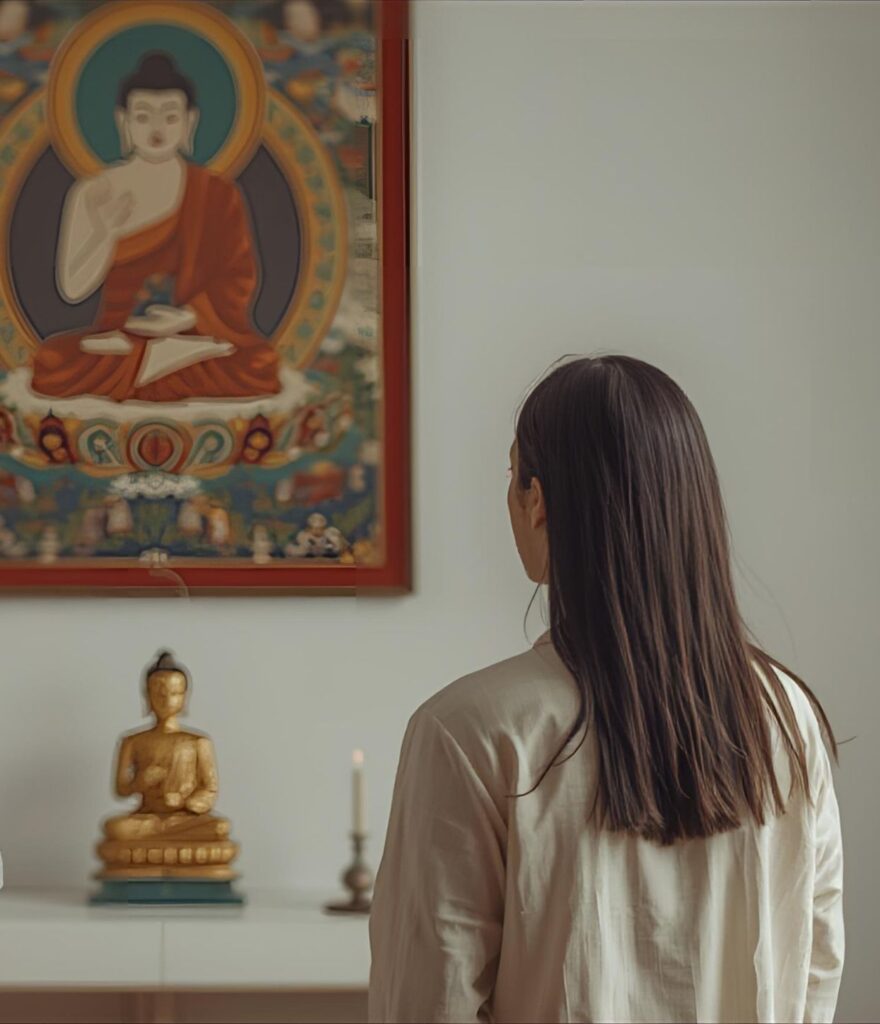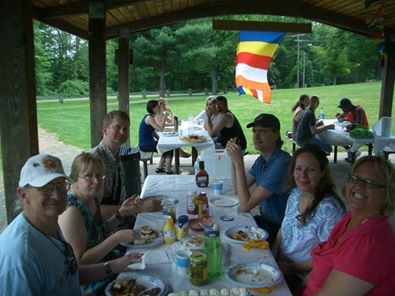In the midst of busy lives, how do we actually practice Buddhism?
Many people ask, “What does it mean to live as a Buddhist in everyday life?” Beyond our daily meditation and home sadhana, we also observe Uposatha, a dedicated day of renewal, ethical clarity, and focused awareness.
The word Uposatha literally means “to stay close” or “to draw near.” Traditionally, it refers to staying close to the teachings and to one’s deepest intention. In the Muluposatha Sutta, the Buddha described Uposatha Days as times for cleansing and purifying the mind. At the Buddhist Faith Fellowship, we understand this not as fixing something broken, but as uncovering what is already whole. Buddha nature is not created through effort. It is revealed as distraction softens and self centered habits loosen.
Historically, Uposatha was observed on new and full moon days. Monastics gathered to recite the Patimokkha, the monastic code of conduct, and lay followers undertook the Eight Precepts. For that day, lay practitioners temporarily lived more simply by refraining from eating after noon, reducing sensory stimulation, and deepening meditation practice. Uposatha observance continues today in Theravada Buddhist countries such as Sri Lanka, Myanmar, and Thailand.
While Mahayana schools such as Zen, Thien, and Shin Buddhism do not formally structure practice around Uposatha, their teachings strongly reflect its spirit of mindfulness, ethical discipline, gratitude, and simplicity.
Because the Buddhist Faith Fellowship is not part of a monastic order, but is an independent and fully lay oriented Buddhist community, our Renewal Practice Days are adapted for contemporary life. In our highly distracted and materially driven culture, setting aside one day each week to reset and refocus has become increasingly meaningful. What began within our Fellowship has grown in popularity as more practitioners seek structure, depth, and renewal.
On Uposatha Renewal Practice Days, we renew our commitment to ethical clarity, simplicity, and gratitude by observing the Eight Precepts and following these Six Practices of Renewal.
The Eight Precepts
On Renewal Days, we undertake the tradtional Eight Precepts as expressed for contemporary life :
1. Practice love; refrain from harming living beings.
2. Practice generosity; refrain from taking what is not freely given.
3. Practice sexual responsibility and contentment; refrain from sexual activity.
4. Practice truthful communication; refrain from false or harmful speech.
5. Practice mindful consumption; refrain from intoxicants and media that cloud the mind.
6. Practice moderation; refrain from eating after noon.
7. Practice natural presence; refrain from entertainment, beautification, and adornment.
8. Practice simplicity and gratitude; refrain from luxury, excess, and unnecessary purchases.

These precepts reflect the traditional observance while speaking directly to modern conditions. They are not imposed rules, but temporary supports for freedom. By simplifying conduct for one day, we soften habitual patterns and allow inherent clarity and compassion to become more evident.
The third precept is sometimes misunderstood. On Uposatha, refraining from sexual activity is not a judgment about sexuality. It is a temporary renunciation that helps redirect energy inward toward clarity and stillness.
Six Practices of Renewal
How We Express Uposatha in Modern Life In addition to observing the Eight Precepts, we:
1. Disconnect from electronic devices and non essential media.
2. Attend Meditation and Talk gatherings when possible.
3. Deepen meditation through sitting, walking, and recitation of the Buddha Name.
4. Study Buddhist teachings through reading or listening.
5. Offer generosity and acts of kindness to humans and non humans.
6. Eat simple vegetarian or raw meals before noon that are free from ultra processed foods, sugar, alcohol, intoxicants, and seed oils.
The Precepts provide the ethical foundation. These Renewal Practices make them tangible within modern life.
Practical Ways to Begin
You may observe the entire day or adapt it according to your circumstances. Even partial observance strengthens awareness.
To support your Renewal Practice:
- Review the Eight Precepts the night before.
- Rise a little earlier and practice our Daily Sadhana and quiet sitting.
- Turn off notifications and reduce digital input.
- Eat slowly and mindfully before noon.
- Recite the Buddha Name throughout the day.
- End the day with reflection and gratitude.
The spirit of Uposatha is renewal, not rigidity. The aim is sincerity, not perfection.
Special Uposatha Days

In addition to our weekly Renewal Practice, the Fellowship hosts a special Satipaṭṭhāna Day, a Mindfulness Retreat, on a quarterly basis. These extended practice days provide additional time for meditation, silence, and contemplation.
We also observe special Renewal Days that correspond to significant Buddhist holidays. On these days, practitioners place special attention on recollecting the meaning and qualities of the occasion and the teachings connected to it.
These include:
April – Flower Festival celebrates the Buddha’s birth.
February – Parinirvana Day recognizes the Buddha death and last teaching.
May – Vesak celebrates the entire life and legacy of the Buddha.
May – Sangha Day celebrates the community and the path.
December – Enlightenment Day celebrates the awakening of the Buddha.
Please consult our website calendar for specific dates.
Questions and Answers
How do I start?
Begin simply. Choose one or two elements and practice them sincerely. You might disconnect from devices, attend Meditation and Talk, and observe the precepts as best you can. Over time, you may deepen your observance.
Do I have to do all of this?
No. Uposatha is voluntary. It is a support for practice, not a requirement. Even partial participation strengthens awareness and intention.
What if I cannot fast?
If fasting after noon is not possible due to health or work conditions, adapt wisely. The purpose is simplicity and mindfulness, not self harm. Consult your physician if you have medical concerns.
Is this required to belong?
No. The Buddhist Faith Fellowship is a lay community. Uposatha Renewal Practice is offered as a gift and an opportunity, not as an obligation.
If you have questions about Uposatha or how to observe the Eight Precepts, please speak with our guiding teachers during a Meditation and Talk Sunday, or during one of our courses, special activities, or field trips. We are here to support your practice.
